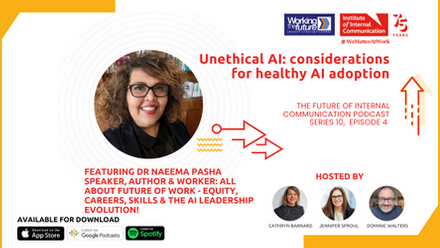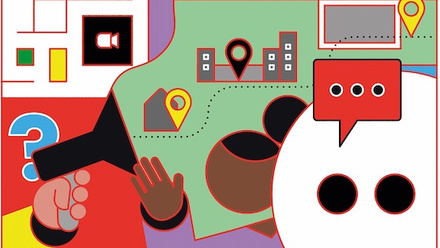Internal communication is important too. Why do I think that? Because I believe that a group of people functions better when the members of the group understand each other - when they understand each other's intentions, motivations and (yes) feelings. Good internal communication is about enabling the members of the group to understand each other. When you hire someone to do that job for you, you want to know they are credible.
When I started my first job in internal communication, I had no idea what I was doing. None. Zilch. I was writing things, publishing things, surveying people, setting up events etc. etc. But I was doing all of that without a clear sense of purpose or impact and - increasingly - I was feeling like my own decisions were all just a little bit... random. A couple of jobs later I'd picked up some things. When I was sitting down with someone who wanted to communicate something I was much more likely to ask them what end goal they had in mind, and the quality of my planning, writing, survey design and event management had all improved. But I didn't feel like I'd really made a real leap forward.
The thing that changed it for me was doing the Postgraduate Diploma in Internal Communication Management, then with Kingston University. The course included modules on things like how the brain makes sense of information, the kinds of cultures organisations can take on and how people respond to change. It opened my eyes to the context I was working within. It was, in fact, one of the course tutors who used the term 'mutual understanding' to describe the purpose of IC. I hold that in my mind every day now. But 'mutual understanding' is hard. In its way are our innate biases, power dynamics (and the distrust created by them on all sides), risk aversion, lack of capability, lack of motivation... I could go on. But a good internal communicator, standing in the middle of this, can make a difference. They can translate between members of the group, smoothing the path to understanding by providing relevant facts, making cases and enabling constructive conversations. It's a tricky, varied and complex role requiring both business sense and emotional intelligence. So you need a good professional.
It was a few years after I did the diploma that I finally joined the Institute of Internal Communication as a member. Not long after that, I put myself forward (after a nudge from a friend) to be a board member. It's a role that has become increasingly important to me because, as an institute, I believe it's our responsibility to promote practice of internal communication that directly results in mutual understanding and business performance. We have the potential to bring the profession together, challenge ourselves on whether our practice is purposeful and effective, and inspire each other to get better and better at what we do.
And that's what it's all about for me - my involvement with the IOIC makes me a better professional and gives me the chance to help others achieve the same thing. Because it's by developing as a profession that we can make more of a difference - for the organisations we work for, and our economy and society more broadly.




